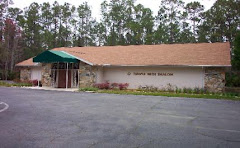
The public is invited to a unique Choral Concert at Temple Beth Shalom, Saturday evening, September 8th in the synagogue's sanctuary at 40 Wellington Drive, Palm Coast, Florida 32164. The concert will introduce the traditional Selichot Service at Flagler County's central synagogue and thus help to usher in the High Holy Day season that begins with the eve of Rosh HaShannah, Wednesday evening, September 12th and ends 22 days later with the celebration of Simchat Torah, when the yearly cycle of the reading of the Five Books of Moses is completed and begun anew!
The concert features Chorus Director Marina Lupina a graduate of the reknown Moscow Conservatory of Music. Founded in 1866 by Nikolai Rubinstein, brother of the famous Russian pianist and composer Anton Rubinstein, who founded the St. Petersburg Conservatory in 1862.
At its opening, Tchaikovsky was appointed professor of theory and harmony, a post he held until approximately 1878. Since 1940, the conservatory has borne Tchaikovsky's name. Notable alumni of the Conservatory include Palm Coasts, Lapina and pianist Boris Berezovsky, composer Dmitry Borisovich Kabalevsky, composer, pianist and conductor Sergei Rachmaninoff and cellist Mstislav Rostropovich.
At its opening, Tchaikovsky was appointed professor of theory and harmony, a post he held until approximately 1878. Since 1940, the conservatory has borne Tchaikovsky's name. Notable alumni of the Conservatory include Palm Coasts, Lapina and pianist Boris Berezovsky, composer Dmitry Borisovich Kabalevsky, composer, pianist and conductor Sergei Rachmaninoff and cellist Mstislav Rostropovich.
Lupina has led choirs throughout Europe and North America and taught Choral Conducting. She is currently on the faculty of several colleges and universities in Central Florida.
Selichot are special prayers for forgiveness, properly pronounced "s'lee-KHOHT," but often pronounced "SLI-khus" in Ashkenazi communities. They are usually said on fast days, and also said during the period preceding Yom Kippur. In the Sephardic tradition, Selichot are said beginning with the month of Elul, through Yom Kippur to help worshipers direct their hearts and minds to the process of teshuvah, repentance. At the Selichot service, worshipers begin to examine their deeds of the past year, seeking forgiveness from God, and promising to improve their behavior in the New Year. In the Ashkenazic tradition, Selichot are begun at a time such that there will be ten daily opportunities for their recitation before and including Yom Kippur. This is based on the custom, once prevalent, that Jews would fast for ten days (eating at night) before and including Yom Kippur.
In general, the proper time to say Selichot are at the end of the night, just before the morning, since this time is considered, according to Jewish Mysticism, a specially favorable time, in terms of the presence and closeness of God. Hence, selichot are typically recited in the early morning, before the daily Shacharit service. They add about 45 minutes to the regular daily service.
Selichot are recited from the Sunday before Rosh Hashannah until Yom Kippur. If Rosh Hashannah begins on a Monday or Tuesday, selichot begins on the Sunday of the week before Rosh Hashannah, to make sure that there are at least three days of Selichot. The first selichot service of the holiday season is usually a large community service, held around midnight on Motzaei Shabbat (the night after the sabbath ends; that is, after nightfall on Saturday). The entire community, including men, women and older children, attend the service, and the rabbi gives a sermon.
Selichot are recited from the Sunday before Rosh Hashannah until Yom Kippur. If Rosh Hashannah begins on a Monday or Tuesday, selichot begins on the Sunday of the week before Rosh Hashannah, to make sure that there are at least three days of Selichot. The first selichot service of the holiday season is usually a large community service, held around midnight on Motzaei Shabbat (the night after the sabbath ends; that is, after nightfall on Saturday). The entire community, including men, women and older children, attend the service, and the rabbi gives a sermon.
The first night of Selichot is different from the other days. First, it is customary to say Selichot the first night before going to sleep, and, since the first part of the night is considered a time of din, judgment, the Selichot are not recited on the first night until after chatzot, relative midnight. A person should consult a Jewish Calendar or their Rabbi to determine the specific time of chatzot for their area.
A fundamental part of the selichot service is the repeated recitation of the "Thirteen Attributes," a list of God's thirteen attributes of mercy that were revealed to Moses by G-d after the sin of the golden calf (Exodus 34:6-7): "Hashem, [1], Ha-shem [2], G-d [3], merciful [4], and gracious [5], long-suffering [6], abundant in goodness [7] and truth [8], keeping mercy unto the thousandth generation [9], forgiving iniquity [10] and transgression [11] and sin [12], who cleanses [13]." Why is "Ha-shem" listed twice as an attribute? And why are three of these "attributes" Names of G-d? Different names of G-d connote different characteristics of Him. The four-letter Name of G-d (rendered here as "Ha-shem," literally "the name") is the Name used when G-d is exhibiting characteristics of mercy, and the Talmud explains that this dual usage indicates that G-d is merciful before a person sins, but is also merciful after a person sins. The third attribute is a different Name of G-d that is used when G-d acts in His capacity as the almighty ruler of nature and the universe. G-d appeared to Moses and taught him these Thirteen Attributes saying, "Whenever Israel sins, let them recite this in its proper order and I will forgive them." Thus, this appeal to G-d’s mercy reassures that repentance is always possible, and that G-d always awaits a return to Him. The implication is also that if people emulate G-d’s merciful ways, He will treat them mercifully in return.

No comments:
Post a Comment